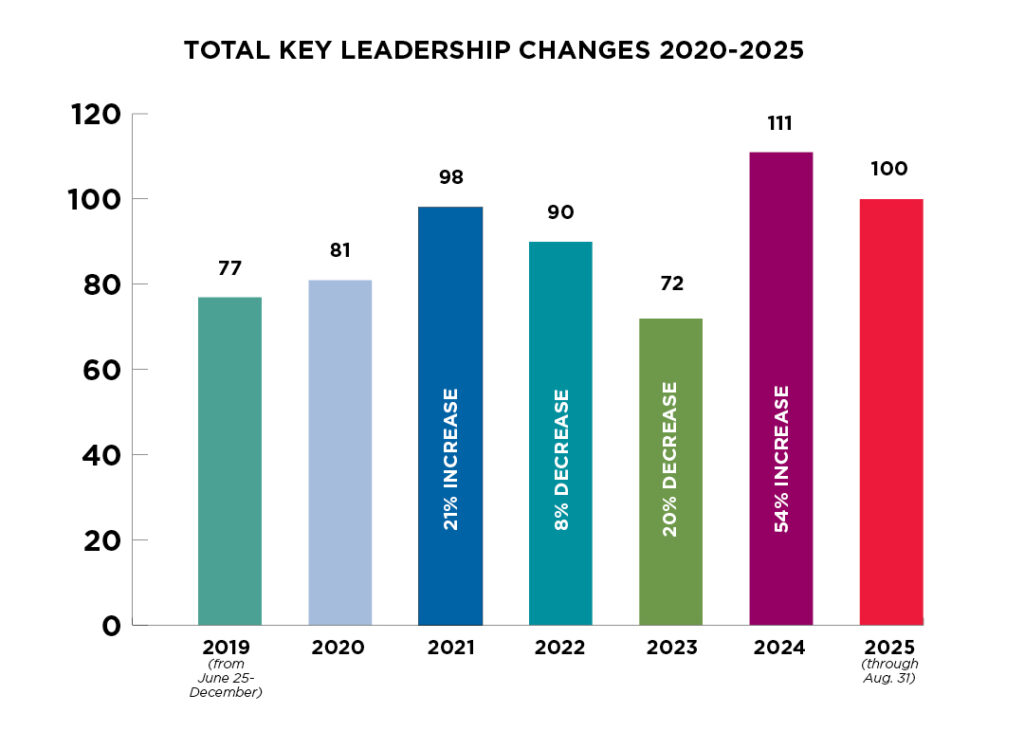Two questions for marketing pros
AI and accessible technologies are creating greater brand reach using people-centered storytelling

Mike Mendenhall Oct 18, 2024 | 6:00 am
7 min read time
1,771 wordsHR and Leadership, Innovation and EntrepreneurshipThere was one recurring theme throughout the Business Record’s recent survey which asked Central Iowa marketing industry experts about the most significant industry trends changing or advancing their industry the year ahead: artificial intelligence.
Marketing professionals are using AI to analyze audience data and better target the people their clients want to reach at a time when coding and industry-standard programs are becoming more broadly accessible. Companies are still looking for people-centered storytelling to drive their brands, but the fast-advancing technology allows more people to see and interact with that message.
Here are the industry trends that seven local marketing executives told the Business Record they are watching for in the next year:
– Mike Mendenhall, associate editor, Business Record
What is the most significant industry trend that is changing or advancing marketing in the year ahead?

Brett Adams, president and chief marketing officer, Trilix
Leveraging AI effectively — and ethically — is a hot topic in the marketing industry. The technology is evolving rapidly, so marketers must establish best practices for using it to complement their services while being mindful of its vulnerabilities. Consider the pros and cons.
Pros: AI tools can automate repetitive tasks, predict conversion rates, inform [search engine optimization], develop messaging frameworks, analyze large quantities of data and provide insights that improve customer understanding.
Cons: AI can lead to quality control issues. It struggles to detect human emotion and decipher what is fact and what is fake. AI hallucination and bias can contribute to misleading data and information being shared. It can also lead to copyright infringement and intellectual property misconduct.
While AI can be used to support and even advance marketing efforts, it can’t replace human intelligence and intuition.

Laurie DePhillips, vice president, Red Dot Branding + Marketing
Regardless of the technologies or mediums used, the most significant trend we’re clued into is people-centered storytelling — how it strengthens messaging, builds community and solidifies a brand. Brands are moving beyond product-centric messages to forge authentic connections with their audiences. This approach focuses on how products and services improve the lives of those who use them, resonating deeply with customers and fostering loyalty. In addition, maintaining a seamless presence across online and offline platforms with these stories is crucial. This trend not only differentiates brands in a competitive market but also creates more meaningful engagement and lasting brand loyalty.

Chandler Faldet, founder and president, Hatch
Advances in design and web development are making it easier for nondesigners to design and for designers to more easily develop complex solutions. Instead of supplying a brand style guide or completed designs to our clients, we now may be supplying a Canva Brand Kit, Adobe Express social templates or Google Slides presentations so they are able to produce a higher volume of content that stays on brand. Applications like Webflow, Jotform and Zapier have made it much easier for designers to act as developers. Code is becoming more easily accessible as well. Producing the right prompts in ChatGPT provides a lot of solutions that weren’t available a year ago. Now that most software is cloud based, we are more easily able to connect software directly using simple scripts or third-party companies like Zapier to connect one data point to another instead of developing complex databases to do the same task.

Tom Flynn, president, Lessing-Flynn
It would be easy to say AI. There are so many new tools we are using or experimenting with in that area that will change marketing. But over the next year, privacy is becoming a big issue. People are much more aware of how their personal data is used. As marketers, there are so many ways to use data to target specific audiences. But newer laws and regulations are becoming much more strict. That means marketers who develop and use their own customer data are going to have an advantage. As a result, we are seeing clients being much more intentional about using [customer relationship management] tools like HubSpot and Salesforce in their marketing efforts and buttoning up things like website visitor compliance policies. We are also making sure tools and partners we work with are following these best practices. These are definitely not the “sexy” parts of marketing, but they are important in maintaining trust in your brand and keeping out of legal issues.

Brock Konrad, vice president of marketing, Catch Des Moines
AI continues to be the fastest evolving technology and disruptor in the marketing world —and probably outside of marketing, too, if we’re being honest. From AI’s assistance in content ideation and even creation to its power in advertising, with huge jumps in analyzing audience data to better serve your content and message to the right people. As much as it can be a great thing, I think it can also be really challenging for marketers. It looks completely different for them based on what industry they work in.

John Schreurs, CEO and president, Strategic America
The most significant industry trend affecting marketing is the integration of artificial intelligence. Advances in AI are enabling brands to personalize experiences at an unprecedented scale, allowing for real-time data analysis and hyper-targeted messaging. Leveraging AI in operations, data insights and campaign metrics streamline campaign management, improving efficiencies and making it easier for brands to quickly adapt to market changes.

Emily Toribio, vice president of marketing and communications, Community Foundation of Greater Des Moines
Reaching targeted audiences with meaningful messages has become increasingly difficult with digital advertising and recent privacy laws enacted. Compounded with AI-generated content, the changing landscape of touching audiences with authentic messaging and appropriate language has become an area of opportunity for marketing professionals to continue to be creative and original. Trying on new tactics, measuring results and testing what performs well will continue to challenge our industry to be agile and intentional. In this ever-changing field, embracing new technologies and striking a balance between adoption, remaining relevant with the latest trends, keeping data secure and being an ethical steward of our brands has become increasingly difficult to navigate but also rewarding when wins are realized.
As marketing algorithms and AI get more sophisticated, how do you ensure your clients’ brand(s) and messaging break through to audiences?
Adams: It comes down to authenticity and how you deliver it. As marketers, we must first consider the fundamental purpose of a product or service, the “why” behind an organization’s actions. Brands that can meet their consumers and customers in a place where they both believe the other has their best interests at heart are generally the ones that come off as the most genuine and authentic. Fortunately, the advancement of the metaverse and AI has unlocked new possibilities for businesses to better understand and connect with their audiences. But customers and consumers are smart and can see through any fluff. In today’s world, authenticity reigns supreme. One way a brand can deliver its message in a believable and purposeful way is through video. Video allows us to harness the power of storytelling through raw, emotional and visual connections that resonate with the audience.
DePhillips: As everything is increasingly driven by data and algorithms, authenticity is nonnegotiable. At Red Dot, we believe in honesty, integrity and authenticity. If you don’t have that, nothing else matters. We help brands break through by staying true to their core values, crafting messages that resonate on a human level. Our approach prioritizes genuine connections, ensuring that every interaction reflects the brand’s real essence, which we uncover through research and strategic positioning. By focusing on what’s true and meaningful, we create messages that cut through the noise, building trust and fostering long-term relationships with audiences.
Faldet: Algorithms and AI are making it much easier to optimize digital campaigns, but the companies spearheading these efforts like Google and Facebook are becoming more demanding for more assets like images in different sizes, videos, headlines and long-form copy to mix and match across properties and to optimize campaigns. They’re also starting to build out duplicate campaigns using AI without consent, so keeping a close eye on these types of AI campaigns is important as they sometimes aren’t meeting brand standards. It really comes down to brand stewardship. We need to help meet our clients’ business goals while appeasing the platforms’ need for more assets. With that, it’s still incredibly important to have memorable messaging that is authentic to the brand and pushes through the clutter of today’s marketing, which is up to an estimated 10,000 brands consumed each day.
Flynn: Research shows that marketers with messaging that makes you “feel” something, whether that’s fear, humor, etc., are six to seven times more effective than “boring” ads. That means presenting your message creatively so it attracts someone’s attention can significantly reduce the amount you spend on media, while still getting the same impact. So we’ve developed some really smart strategies and tools to make sure messaging is consistent and engaging.
Konrad: Using AI and marketing algorithms help you dial in your audience, messaging, creative, conversion funnels, honestly, about the whole marketing funnel. It can help you advance in better knowing who your best audiences are, what creative or advertising messages best resonate with them, how to tweak or adjust each over time, and on the flip side, which campaigns you need to move away from using. In my opinion, these are things any good marketer can do themselves by diving into data, doing plenty of A/B testing, etc., but AI helps you get to conclusions and suggestions much faster, which in today’s world is very important.
Schreurs: As sophisticated as AI and marketing algorithms have become, they can never replace human creativity and genuine connections. To ensure our clients’ brands stand out in a crowded, competitive field, we focus on understanding the brands’ target audiences and craft compelling messages that address their needs and preferences. We leverage data analytics to identify key touch points and optimize content for various platforms, ensuring the messaging reaches audiences effectively. Emphasizing creativity and genuine engagement helps brands cut through the noise and build positive momentum.
Toribio: At the Community Foundation, we strive for both awareness and understanding of who we are and how we can serve as a resource with new, diverse and target audiences. Our core messaging continues to be authentic storytelling that inspires greater giving to the causes and communities we love. Through placement in diverse publications, new channels, such as podcasts, video series and testing and measuring in the digital and social space, we aim to make charitable giving accessible to all — no matter the age or stage. We really are better together, better forever.

Mike Mendenhall
Mike Mendenhall is associate editor at Business Record. He covers economic development, government policy and law.










